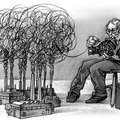After suffering its steepest drop in nearly four years, the stock market showed some tentative signs of recovery today, rising slightly in early trading.

Investors watched stocks on computer and TV screens at Tianyuan Securities Co. Shanghai in Shanghai. More Photos
At the opening bell of the New York Stock Exchange at 9:30, share prices advanced enough to push both the Dow Jones industrial average and the Standard and Poor’s 500-stock index above Tuesday’s closing levels. The gains were small, however, and sometimes fleeting as both indexes fluctuated in and out of positive territory.
The broad global sell-off of stocks on Tuesday wiped out the gains the Dow and the S.& P. made for the year. At the end of the trading day, both indexes had values about equal to where they stood at the end of November. The Dow lost 416 points, or about 3.3 percent. The broader S.& P. lost about 3.5 percent of its value.
The Nasdaq composite index, heavy with technology stocks, fell 3.9 percent on Tuesday and continued to slump in early trading today.
Across the world, stock markets continued to feel the fallout from Tuesday’s global dive. Stock markets fell sharply across most of Asia again and continued to decline in Europe.
But share prices rebounded in Shanghai and Shenzhen, the mainland Chinese stock markets that had been the first to tumble in Tuesday’s global sell-off, when they each fell nearly 9 percent.
Both mainland Chinese markets rose nearly 4 percent today after state-controlled media reported that the government might allow greater foreign investment in Chinese stocks and would not impose capital gains taxes on stocks soon.
Stock markets elsewhere fared much worse today.
In Tokyo, the benchmark Nikkei 225 index fell 4.1 percent in early trading, before recovering a bit to end the day down 2.9 percent.
In Hong Kong, the Hang Seng index fell 2.5 percent. It, too, showed a slight recovery from heavier losses in morning trading.
Practically every other stock index in Asia outside of mainland China also fell.
Major European markets opened with swift, steep falls, but soon began to retrace some of losses, and by early afternoon had pared their losses to around 1 percent. Investors in Asia and Europe appeared to pay less attention to the Chinese markets than to the drop on Tuesday in American stock indices, and to a Commerce Department report on Tuesday that manufacturing in the United States is ailing more than had previously been realized.
Given the rebound today in mainland Chinese stocks, “this morning’s price reaction in Europe shows it is not just China,” Nigel Richardson, the Hong Kong-based chief investment officer in Asia for AXA Investment Managers, said.
The managing director general of the Asian Development Bank, Rajat M. Nag, said in an interview in Hong Kong this morning that the economic fundamentals of most Asian economies were strong. But the region remains dependent on exports, especially to the United States, Mr. Nag said. China is among the most dependent of all, he said, with international trade in goods equal to 65 percent of its economic output last year.
“We are still fairly bullish on the Chinese economy’s growth potential,” Mr. Nag said, but he added that its dependence on exports “is a vulnerability.”
China’s current difficulties are partly a case of the Beijing government getting what it wished for, only to regret it.
The Chinese government has limited the appreciation of the country’s currency, the yuan, by buying dollars on a massive scale. As a result, it has accumulated more than $1 trillion in foreign exchange reserves.
To pay for the dollars, the Chinese central bank has issued hundreds of billions of yuan.
The central bank has been able to absorb some of these extra yuan by selling more government bonds to Chinese banks and the public. But part of the extra cash issued to pay for currency market intervention has made its way into the financial system.
This has contributed to steep rises in stock prices — the Shanghai stock market rose 130 percent last year — and in real estate prices. The slump in share prices on Tuesday has raised questions about the long-term sustainability of high prices for Chinese assets.
But it remains unclear how much the rest of the world should care about mainland Chinese stock market prices.
Government regulations have kept foreign investment in these markets to insignificant levels by international standards. In addition, most Chinese still put their money in bank accounts or in real estate instead of buying stocks, and Tuesday’s plunge, while dramatic, merely returned the Shanghai stock market to where it began the month.
The consensus of economists today was that the volatility in mainland stocks would have little if any effect on the enduring strength of economic growth in China.
The stocks of Asian companies that export to the United States, such as the Sony Corporation, suffered particularly heavy losses today following the report on Tuesday from the Commerce Department that orders for cars, washing machines and other durable goods dropped 8 percent in January.
“There is a worry that U.S. consumption could slow substantially, and that is a much bigger factor than China’s stock market,” the chief Asia economist in the Hong Kong offices of Credit Suisse, Tao Dong, said.
Analysts said the biggest factors were concerns about a possible downturn by the American economy and whether that would lead to cuts in interest rates by the Federal Reserve. That could in turn undermine the value of Japan’s currency, the yen. They said the effect of the Shanghai drop was felt indirectly via its impact on New York.
Tokyo and Hong Kong markets had barely seemed to blink on Tuesday as Shanghai fell. The Nikkei 225 index slipped a mere 0.5 percent that day and the Hang Seng fell 1.8 percent.
Analysts pointed out that Tokyo and even Hong Kong have rarely taken their cues from Shanghai, a small and highly volatile market that often seems to sit on the fringes of global capital flows because of the government regulations that have limited foreign investments to less than 1 percent of the market capitalization.
One factor behind the rebound today in mainland markets was a report in the Shanghai media that the government might increase the cap on foreign investment to 10 percent of the market. That report, together with signs the government would not move quickly to impose capital gains taxes, helped offset continuing nervousness about the Chinese central bank’s ongoing campaign to put the brakes on the economy by pushing banks to slow their rapid growth in lending.
Elsewhere in Asia today, the Indian market fell 4 percent, Singapore dropped 3.7 percent, South Korea was down 2.8 percent, Australia dipped 2.7 percent and Thailand crept down by 1 percent. Most markets pared their losses in the afternoon following steeper declines in the morning.
The worst performer for the day in Asia was the Philippines, the market with the earliest closing time. It fell nearly 8 percent without benefiting from the afternoon rebounds elsewhere. Foreign investors were the main sellers in the Philippines and many other markets.
Luz Lorenzo, an economist in Manila at ATR Kim Eng Securities, said that were it not for purchases by domestic institutions in the Philippines on Wednesday “it could have been worse.”
The broad extent of the decline in Asia underlined the region’s deepening connection to global financial markets and growing reliance on exports to the industrialized world.
“Every morning, most traders will get a fix on how the Asian markets are trading and how did the Nasdaq close — I think people have gotten more globalized,” Sandeep Nanda, head of research at Sharekhan, a large retail brokerage firm in India, said.
Some customers at brokerages in Asia admitted to being mystified by the sharp movements in share prices. “I am buying in the hope that the share price will rise — I really feel like a gambler sometimes,” said Moon Chung-lien, a 65-year-old retiree who wore a puzzled expression and knitted brow as he busily punched stock codes into a computer at the Hong Kong offices of the Shanghai Commercial Bank early this afternoon.
Tim Condon, the head of financial markets research at ING Financial Markets in Singapore, said that the most significant feature of the worldwide drop in stock markets was that it was the first such global shock to financial markets that has emerged from China.
“It’s a recognition of the fact that China is a big part of the rally in risky assets,“ Mr. Condon said.
The sharp drop in durable goods orders in the United States prompted concerns that Ben Bernanke, the chairman of the Federal Reserve, may be forced to cut interest rates to reinvigorate economic growth. Lower interest rates would be likely to drive down the dollar versus the yen, hurting the profits of exporters, such as Toyota and Sony, by eroding the yen value of overseas profits.
The prospect of lower American interest rates brought a sharp rise by the yen overnight in New York, where it climbed from about 120 yen per dollar to around 117.93 yen. In Tokyo trading, the yen yielded some of those gains, slipping to 118.32 yen.
The possibility of rate cuts by the Federal Reserve also kindled concerns that American interest rates might eventually fall far enough to significantly close the gap with Japan’s rock-bottom rates. That gap is wide now. Japanese overnight lending rates are 0.5 percent compared to 5.25 percent in the United States.
But if the gap shrinks, it could slow or halt the so-called yen carry trade, in which investors borrow hundreds of billions of dollars worth of Japanese money to invest in stock markets across Asia and around the world in search of higher returns.
If this flow of money stops, or reverses, it could prompt larger sell-offs on Wall Street and drive the yen even higher, hurting Japanese exporters even more, analysts said.
“Bernanke holds the trigger,” said Kiichi Fujita, a strategist in Tokyo for Nomura Securities. “If he cuts interest rates in America, the worry is that the yen carry trade will unwind.”
Part of the financing for the abundant cash flowing through global markets has also come from what many economists say is a surplus of savings by China, including China’s more than $1 trillion in foreign exchange reserves. China is now a leading source of global capital, with the money funneled back into global financial markets through Chinese investments in Treasury bonds and other securities. “So when people get anxious that China may turn that tap off, we get market reactions like yesterday,” Mr. Condon said.
In Thailand and many other southeast Asian countries, a major concern is the prospect of further weakness in the dollar, combined with weak demand from the United States. Thai exports of cars, rice, sugar, and electronics have already become more expensive on the world market after a 17 percent rise by the baht against the dollar in 2006.
There is less concern in Thailand about the stock market. The Thai market has been dragged down by the country’s long-running political crisis. It fell about 5 percent in 2006, even as Shanghai’s market rose 130 percent last year.
Supavud Saicheua, the managing director of Phatra Securities, which conducts research for Merrill Lynch in Thailand, said that the Thai market was unlikely to fall much further. But he cautioned that it was hard to predict how long international stock markets would continue to be worried by broader concerns.
“The problem,” Mr. Supavud said, “is that we don’t know how big of a worry this is going to be.”





